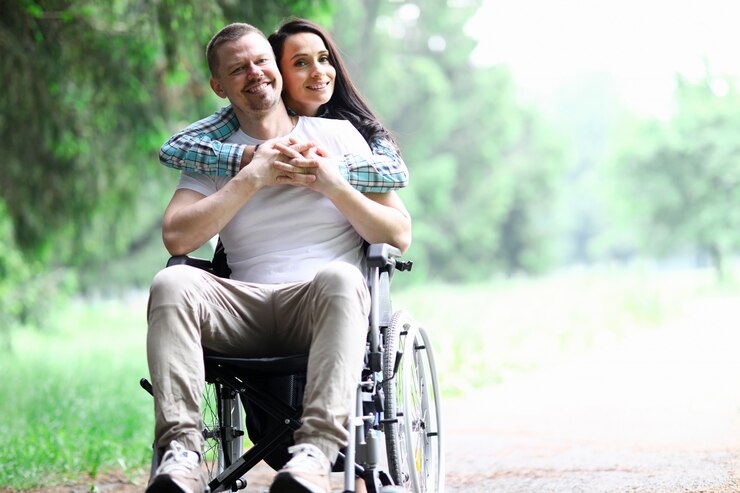Trauma And Intimacy - The Hidden Effects Of Trauma In Relationships
There's a robust connection between trauma and intimacy. In this context, the term "trauma" refers to any personally traumatic experience that has altered one's outlook. As a result of being in "fight or flight" mode all the time after experiencing trauma, it may be very challenging to maintain healthy relationships.
Author:Suleman ShahReviewer:Han JuOct 05, 2022127 Shares1.7K Views

There's a robust connection between trauma and intimacy. In this context, the term "trauma" refers to any personally traumatic experience that has altered one's outlook.
As a result of being in "fight or flight" mode all the time after experiencing trauma, it may be very challenging to maintain healthy relationships.
When you feel on edge all the time and that you need to be vigilant all the time, it's hard to put your faith in other people. Every person experiences trauma in their own unique way.
Sexual assault, physical abuse, verbal abuse, natural catastrophes, the death of a loved one, and other traumatic events are only a few of the numerous causes. Trauma is something that most individuals may encounter at some point in their lives, and its effects might vary from person to person.
How Does Trauma Impact Intimacy?
The belief that sexual traumacauses difficulties with closeness and sex is widely held. Even while this could be accurate in certain cases, it's important to note that sexual trauma isn't the only kind of trauma that can cause this.
Any traumatic experience may cause a person to feel uneasy, insecure, and even panicked. This manifests in a number of ways, including but not limited to:
- Disinterest in sexual activity
- Touch sensibility
- Always trying to find a way out
- paranoid about being touched in ways that aren't sexual
- Irritability
- An inability to verbalize emotions
- Avoidance
If we've been through anything that made us feel threatened, which dampened our sexual drive, triggered fear, or made our skin physically crawl when touched, then it might seem hard to have any kind of intimate physical contact with our partner. This may be devastating to our relationships and a major roadblock to progress.
Effects Of Trauma In Sexual Relationships
Sexual trauma is among the most distressing experiences a person can have, but it is all too frequent. Rape, sexual assault, sexual harassment, and even childhood molestation are all examples of the kinds of non-consensual sexual experiences that may lead to trauma. Because of the subjectivity of trauma, the experience must be defined differently by each person.
Rape and sexual assault occur at an estimated annual rate of over 400,000 in the United States, and this figure is likely low. Addiction to substances and post-traumatic stress disorder are common among those who have survived sexual trauma. A person's whole lifemay be turned upside down after experiencing sexual trauma, and that includes their sexual life.
There is a wide spectrum of sexual reactions to trauma, from aversion to hyperactivity. Respecting one's own limits and progressing at a speed that feels comfortable is the most critical component of healing after sexual assault since there is no one timeframe or coping method that will work for every victim. Even though healing may be difficult, returning to consensual sex is an option for those who desire it.
Negative body image, flashbacks, and post-traumatic stress disorder are common factors that prevent people from returning to consensual intimacy after experiencing trauma. A trauma-informed therapist may greatly aid in the recovery process, so seek one out if possible.

Sexual & Intimacy Trauma in Intimate Relationships
People Also Ask
Does Trauma Make You Less Affectionate?
At the moment of the traumatic event, the body goes into survival mode, which might be either "fight," "flight," or "freeze." As a result, our bodies may continue to release stress chemicals like cortisol, which have the unintended consequence of making us feel distant from those we care about.
What Trauma Causes Fear Of Intimacy?
There are several potential root causes of avoidance of close personal relationships, such as a historyof abuse or neglect, physical or mental healthissues, the fear of being abandoned, or strongly held religious convictions. It may be a mix of factors, in which case it's best to have an expert have a look at the situation.
What's Intimacy Trauma?
Intimacy trauma occurs as a result of a traumatic childhood event. such as emotional, sexual, or physical abuse from a parent or caregiver, or being ignored or abandoned as a kid. As an adult, you may feel out of control of your emotions and behavior.
Final Words
Sexual trauma is among the most distressing experiences a person can have, but it is all too frequent. Rape, sexual assault, sexual harassment, and even childhood molestation are all examples of non-consensual sexual experiences that may lead to trauma. The spectrum of sexual reactions to trauma includes both rejection and hypersexuality.
The most crucial thing for a victim of sexual assault to do is to respect their personal limits since there is no one timeframe or coping approach that will work for everyone.
Dissatisfaction with one's physical appearance, flashbacks, and post-traumatic stress disorder are all factors that might get in the way of consensual intimacy being resumed. If you can find one, consult a therapist who understands the effects of trauma.

Suleman Shah
Author
Suleman Shah is a researcher and freelance writer. As a researcher, he has worked with MNS University of Agriculture, Multan (Pakistan) and Texas A & M University (USA). He regularly writes science articles and blogs for science news website immersse.com and open access publishers OA Publishing London and Scientific Times. He loves to keep himself updated on scientific developments and convert these developments into everyday language to update the readers about the developments in the scientific era. His primary research focus is Plant sciences, and he contributed to this field by publishing his research in scientific journals and presenting his work at many Conferences.
Shah graduated from the University of Agriculture Faisalabad (Pakistan) and started his professional carrier with Jaffer Agro Services and later with the Agriculture Department of the Government of Pakistan. His research interest compelled and attracted him to proceed with his carrier in Plant sciences research. So, he started his Ph.D. in Soil Science at MNS University of Agriculture Multan (Pakistan). Later, he started working as a visiting scholar with Texas A&M University (USA).
Shah’s experience with big Open Excess publishers like Springers, Frontiers, MDPI, etc., testified to his belief in Open Access as a barrier-removing mechanism between researchers and the readers of their research. Shah believes that Open Access is revolutionizing the publication process and benefitting research in all fields.

Han Ju
Reviewer
Hello! I'm Han Ju, the heart behind World Wide Journals. My life is a unique tapestry woven from the threads of news, spirituality, and science, enriched by melodies from my guitar. Raised amidst tales of the ancient and the arcane, I developed a keen eye for the stories that truly matter. Through my work, I seek to bridge the seen with the unseen, marrying the rigor of science with the depth of spirituality.
Each article at World Wide Journals is a piece of this ongoing quest, blending analysis with personal reflection. Whether exploring quantum frontiers or strumming chords under the stars, my aim is to inspire and provoke thought, inviting you into a world where every discovery is a note in the grand symphony of existence.
Welcome aboard this journey of insight and exploration, where curiosity leads and music guides.
Latest Articles
Popular Articles